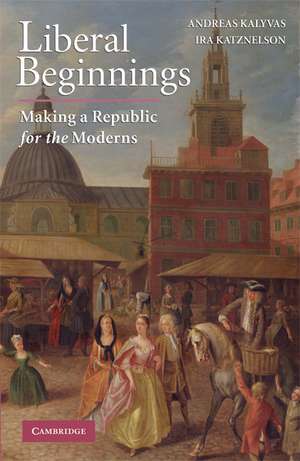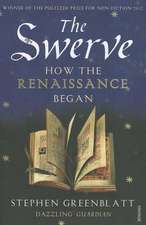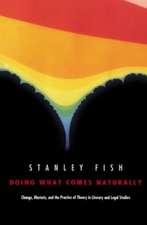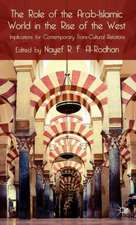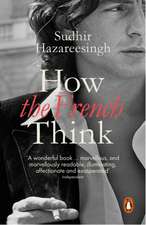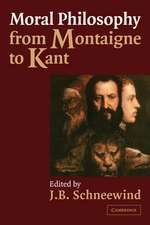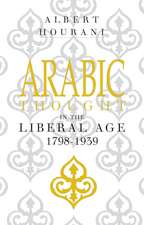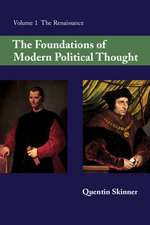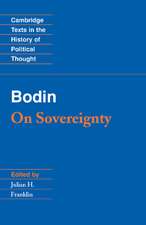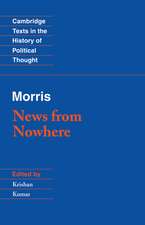Liberal Beginnings: Making a Republic for the Moderns
Autor Andreas Kalyvas, Ira Katznelsonen Limba Engleză Paperback – 29 iun 2008
| Toate formatele și edițiile | Preț | Express |
|---|---|---|
| Paperback (1) | 198.11 lei 6-8 săpt. | |
| Cambridge University Press – 29 iun 2008 | 198.11 lei 6-8 săpt. | |
| Hardback (1) | 592.46 lei 6-8 săpt. | |
| Cambridge University Press – 6 iul 2008 | 592.46 lei 6-8 săpt. |
Preț: 198.11 lei
Nou
Puncte Express: 297
Preț estimativ în valută:
37.91€ • 39.58$ • 31.37£
37.91€ • 39.58$ • 31.37£
Carte tipărită la comandă
Livrare economică 04-18 aprilie
Preluare comenzi: 021 569.72.76
Specificații
ISBN-13: 9780521728287
ISBN-10: 0521728282
Pagini: 200
Dimensiuni: 138 x 216 x 11 mm
Greutate: 0.24 kg
Ediția:1
Editura: Cambridge University Press
Colecția Cambridge University Press
Locul publicării:New York, United States
ISBN-10: 0521728282
Pagini: 200
Dimensiuni: 138 x 216 x 11 mm
Greutate: 0.24 kg
Ediția:1
Editura: Cambridge University Press
Colecția Cambridge University Press
Locul publicării:New York, United States
Cuprins
1. Beginnings; 2. The rhetoric of the market: Adam Smith on recognition, speech, and exchange; 3. Adam Ferguson's agonistic liberalism: modern commercial society and the limits of classical republicanism; 4. After the king: Thomas Paine's and James Madison's institutional liberalism; 5. Embracing liberalism: Germaine de Stael's farewell to republicanism; 6. On the liberty of the moderns: Benjamin Constant and the discovery of an immanent liberalism; 7. After republicanism: a coda.
Recenzii
“This is a terrific book. It offers a persuasive reconstruction of liberalism as a complex tradition of political thought, and underscores the importance of such historical understanding to the revitalization of contemporary political theory and contemporary political science."
-Jeffrey C. Isaac, Indiana University, Bloomington
“The book offers an exceptionally stimulating contribution to the present state of theoretical questions in several fields and to current disputes in the historiography of political thought, as well a subtle contribution to some current political issues. Republicanism is about rhetoric as a resource for knowledge, among other things; and the book by Kalyvas and Katznelson stands out for what it does as well as what it says. It should be heard and answered."
-David Kettler, Bard College
“Are the civic republican and liberal traditions at odds? Did the rise of the latter mean the regrettable death of the former? Kalyvas and Katznelson firmly and persuasively rebut these suggestions, arguing that republicanism became liberal. Challenging an influential body of scholarly opinion, they make their argument by re-examining the work of six of liberalism’s founding political thinkers. A first-rate and long-needed book that should transform the current debate.”
-Steven Lukes, New York University
“Liberal Beginnings proves the fruitfulness of political theory founded on a living history of ideas: a history understood not as a conflict between pre-constituted doctrines, but rather as the product of confronting and resolving intellectual and political problems. This approach leads the authors to reformulate in a new way the question of the relationship between ‘liberalism’ and ‘republicanism’. At the same time, this book offers a stimulating rereading that encompasses the founding fathers of our modernity, and provides a veritable lesson in method.”
-Pierre Rosanvallon, Collège de France
“Liberal Beginnings is one of those rare books that have the great merit of correcting serious historical and conceptual mistakes, in this case the idea, that has become almost a commonplace within the international intellectual community, that republicanism and liberalism have emerged form separated well-springs, each isolated and insulated from the other. The truth is that liberalism ‘was born from the spirit of republicanism’, as Andreas Kalyvas and Ira Katznelson brilliantly explain on the basis of a superb work of historical investigation that casts a fresh light on important and hitherto neglected texts.”
-Maurizio Viroli, Princeton University
“Ever-sharper contrasts drawn by political philosophers between the civic strengths of a lost classical republican tradition and the impoverishment of contemporary liberalism, shorn of all but a preoccupation with negative liberty and the furtherance of the self, have produced an apparent historical conundrum. Why did this republican tradition come to an end? When and how was it so easily displaced by liberalism? And why did so few apparently notice this momentous change? Liberal Beginnings argued that this conundrum is false. Republicanism and liberalism were not two distinct bodies of thought. Rather, the one was a development of the other. ‘Liberalism’ began not as a distinct creed, but as the sum of converging attempts to think out the problems confronting a modern republic. The crucial period in which these attempts were made was that of the era of late eighteenth century revolutions; and Liberal Beginnings supports its important argument by demonstrating the presence of both republican and liberal themes in the writings of six crucial political thinkers during the 1750-1830 period.”
-Gareth Stedman-Jones, King's College, University of Cambridge
-Jeffrey C. Isaac, Indiana University, Bloomington
“The book offers an exceptionally stimulating contribution to the present state of theoretical questions in several fields and to current disputes in the historiography of political thought, as well a subtle contribution to some current political issues. Republicanism is about rhetoric as a resource for knowledge, among other things; and the book by Kalyvas and Katznelson stands out for what it does as well as what it says. It should be heard and answered."
-David Kettler, Bard College
“Are the civic republican and liberal traditions at odds? Did the rise of the latter mean the regrettable death of the former? Kalyvas and Katznelson firmly and persuasively rebut these suggestions, arguing that republicanism became liberal. Challenging an influential body of scholarly opinion, they make their argument by re-examining the work of six of liberalism’s founding political thinkers. A first-rate and long-needed book that should transform the current debate.”
-Steven Lukes, New York University
“Liberal Beginnings proves the fruitfulness of political theory founded on a living history of ideas: a history understood not as a conflict between pre-constituted doctrines, but rather as the product of confronting and resolving intellectual and political problems. This approach leads the authors to reformulate in a new way the question of the relationship between ‘liberalism’ and ‘republicanism’. At the same time, this book offers a stimulating rereading that encompasses the founding fathers of our modernity, and provides a veritable lesson in method.”
-Pierre Rosanvallon, Collège de France
“Liberal Beginnings is one of those rare books that have the great merit of correcting serious historical and conceptual mistakes, in this case the idea, that has become almost a commonplace within the international intellectual community, that republicanism and liberalism have emerged form separated well-springs, each isolated and insulated from the other. The truth is that liberalism ‘was born from the spirit of republicanism’, as Andreas Kalyvas and Ira Katznelson brilliantly explain on the basis of a superb work of historical investigation that casts a fresh light on important and hitherto neglected texts.”
-Maurizio Viroli, Princeton University
“Ever-sharper contrasts drawn by political philosophers between the civic strengths of a lost classical republican tradition and the impoverishment of contemporary liberalism, shorn of all but a preoccupation with negative liberty and the furtherance of the self, have produced an apparent historical conundrum. Why did this republican tradition come to an end? When and how was it so easily displaced by liberalism? And why did so few apparently notice this momentous change? Liberal Beginnings argued that this conundrum is false. Republicanism and liberalism were not two distinct bodies of thought. Rather, the one was a development of the other. ‘Liberalism’ began not as a distinct creed, but as the sum of converging attempts to think out the problems confronting a modern republic. The crucial period in which these attempts were made was that of the era of late eighteenth century revolutions; and Liberal Beginnings supports its important argument by demonstrating the presence of both republican and liberal themes in the writings of six crucial political thinkers during the 1750-1830 period.”
-Gareth Stedman-Jones, King's College, University of Cambridge
Notă biografică
Descriere
An examination of how the modern liberal tradition was fashioned out of an engagement with republicanism.
